Americans are more miserable than people in Zimbabwe, El Salvador and Armenia, according to a “worrying” global report.
The United States ranked 29th out of 71 countries in terms of mood, life outlook, and self-esteem in 2023, while Canada ranked 40th and the United Kingdom 70th.
By comparison, impoverished countries in Africa and Latin America scored the highest, with the Dominican Republic in first place and Tanzania in third.
Researchers at the nonprofit Sapien Labs said the pandemic caused mental health to plummet in the Western world, with no sign of recovery five years later.
In richer countries, children tend to acquire phones at a younger age and the consumption of ultra-processed foods is much higher.
The erosion of friendships and family unity, plus the rise of working from home, could also be ruining mental health, the researchers said.
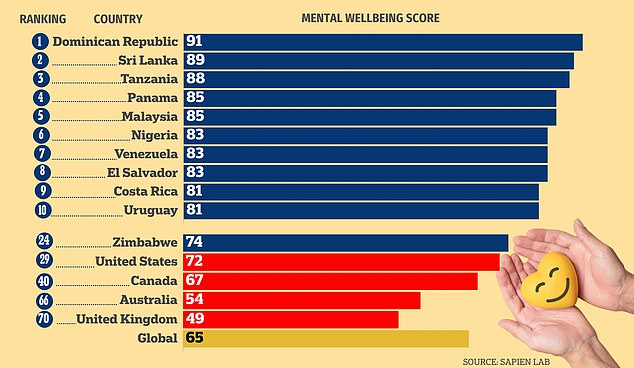
The United States ranked 29th out of 71 countries in terms of mood, outlook, and self-esteem in 2023, while Canada ranked 40th and the United Kingdom 70th.
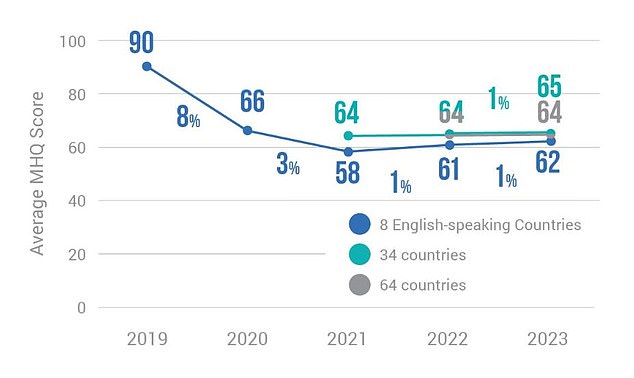

The graph shows mental well-being trends between 2019 and 2023. Since 2021, the average MHQ has shown little change.
“The findings of this report paint a worrying picture of our post-pandemic outlook and we urgently need to better understand the factors driving our collective mental well-being,” the researchers said.
In Western English-speaking countries, young people under 35 experienced the largest decline in mental well-being both during and after the pandemic, while those over 65 have remained relatively stable, the report found.
Researchers collected data from more than 50,000 respondents in 71 countries, with 11 new countries added by 2023.
Data were collected using the MHQ assessment, an anonymous online survey of cognitive and emotional abilities that provides an overall score of mental well-being.
The survey also captured information on demographics, lifestyle factors such as diet and smartphone use, friend and family dynamics, and trauma and adversity.
Mental well-being was broadly defined as an individual’s ability to manage the normal stresses and adversities of life and contribute productively to society.
The MHQ score ranged from −100 to 200. A score less than zero was classified as distressed or struggling, 0–50 meant holding on, 50–10 meant coping, and 100–200 meant success or thriving.
They found that the average MHQ score across the 72 countries in 2023 was 65 out of 200.
About 27 percent of respondents were distressed or struggling, while 38 percent were succeeding or thriving, which is almost identical to the scores in last year’s report.
The five countries with the highest mental well-being are the Dominican Republic, Sri Lanka, Tanzania, Panama and Malaysia.
The Dominican Republic may score the best due to its more relaxed and simple lifestyle. It also scores highly for cleanliness and safety among Caribbean countries.
As an Asian culture, Sri Lankans have very strong family values, which contribute to greater mental well-being. The country also has a simple way of life.
Honduras and El Salvador are also among the top 15 countries for mental well-being, even though so many immigrants come to the United States from there each year.
This may be because the report only looked at mental well-being and not things like people’s financial status.
At the other end of the scale, the bottom five are Tajikistan, Brazil, South Africa, the United Kingdom and Uzbekistan.
The United States Department of State has designated Uzbekistan as a country of special concern due to religious persecution in the country and has defined Uzbekistan as “an authoritarian state with limited civil rights,” which may explain why it was ranked at the end of the list.
Tajikistan, in Central Asia, has been an authoritarian regime since 1994. There is corruption and human rights violations, including torture, and a lack of religious freedom.
The researchers found that indicators of national wealth, such as GDP per capita, were negatively correlated with average mental well-being scores.
Of the 71 countries, eight English-speaking countries have been traced since 2019, an additional 32 countries since 2021, and 64 since 2022.
In English-speaking countries, the average MHQ decreased by eight percent (24 MHQ points) between 2019 and 2020, coinciding with the onset and global spread of the Covid-19 pandemic.
In 2021, the average MHQ of these countries decreased another three percent (8 MHQ points), possibly due to current Covid restrictions such as lockdowns and the need to readjust as things opened up.
Since 2021, the average MHQ, as well as the percentage of respondents who are distressed or struggling, have shown little change.
This suggests that while the declines in mental wellbeing seen during the pandemic have stopped, there has been no recovery to pre-Covid levels since.
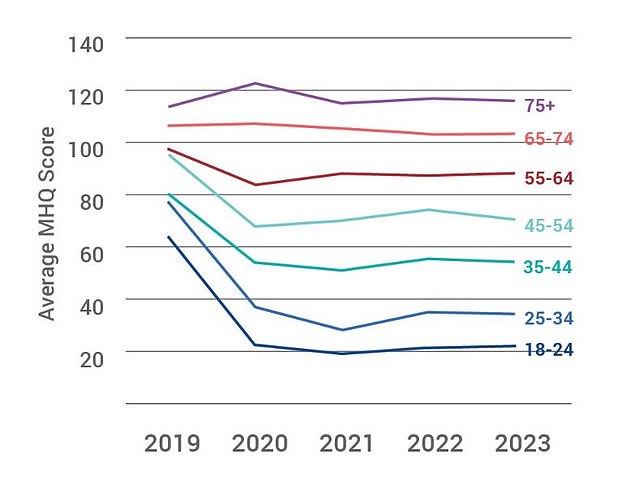

Age trends from 2019 to 2023
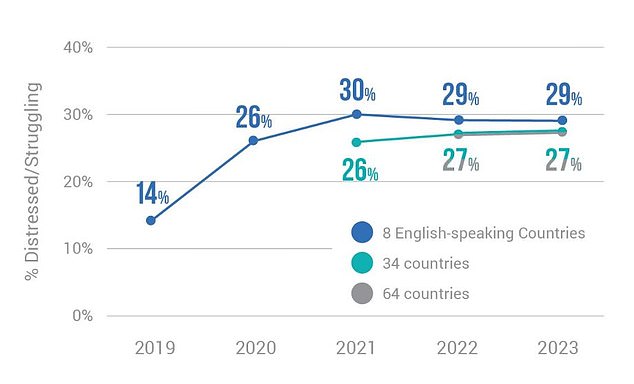

Since 2021, the average MHQ, as well as the percentage of respondents who are distressed or struggling, have shown little change.
The other key trend the researchers noted is that mental well-being is worse in younger age groups.
This movement is evident in all countries among people who can access the Internet.
Before 2010, the youngest age groups always scored highest in surveys on happiness, mood, and outlook factors.
Between 2019 and 2021, people aged 18 to 24 and 25 to 34 decreased between 42 and 50 MHQ points or between 14 and 17 percent of the scale, while people aged 35 to 54 decreased between 30 and 35 MHQ points and those aged 55 to 64, 15 MHQ points. .
In contrast, people aged 65 and older did not experience a large decline during this period. Between 2021 and 2023, in these eight countries and in the 32 countries analyzed during this time, there has been little change in MHQ scores across all age groups.
The Dominican Republic, Sri Lanka and Tanzania topped the rankings with MHQ scores of 88 or higher.
The United States earned a score of 72, a small improvement over the United States’ score of 70 in the 2022 report.
The United Kingdom scored just 49 points, an increase from its score of 46 in 2022. Canada scored just above the average score of all countries at 67, compared to the previous year when it scored 64.
“This runs counter to our common perception that wealth improves well-being,” the researchers said.
One reason behind this is the age at which a child receives their first smartphone, they said.
For today’s 18- to 24-year-olds, who are the first generation to be born into a world of smartphones and social media, the younger they were when they got their first smartphone, the worse their mental health outcomes will be in adulthood. .
About 74 percent of surveyed women ages 18 to 24 who got their first smartphone at age 6 had MHQ scores that fell within a difficult or difficult range.


The report “runs counter to our common perception that wealth improves well-being,” the researchers said.
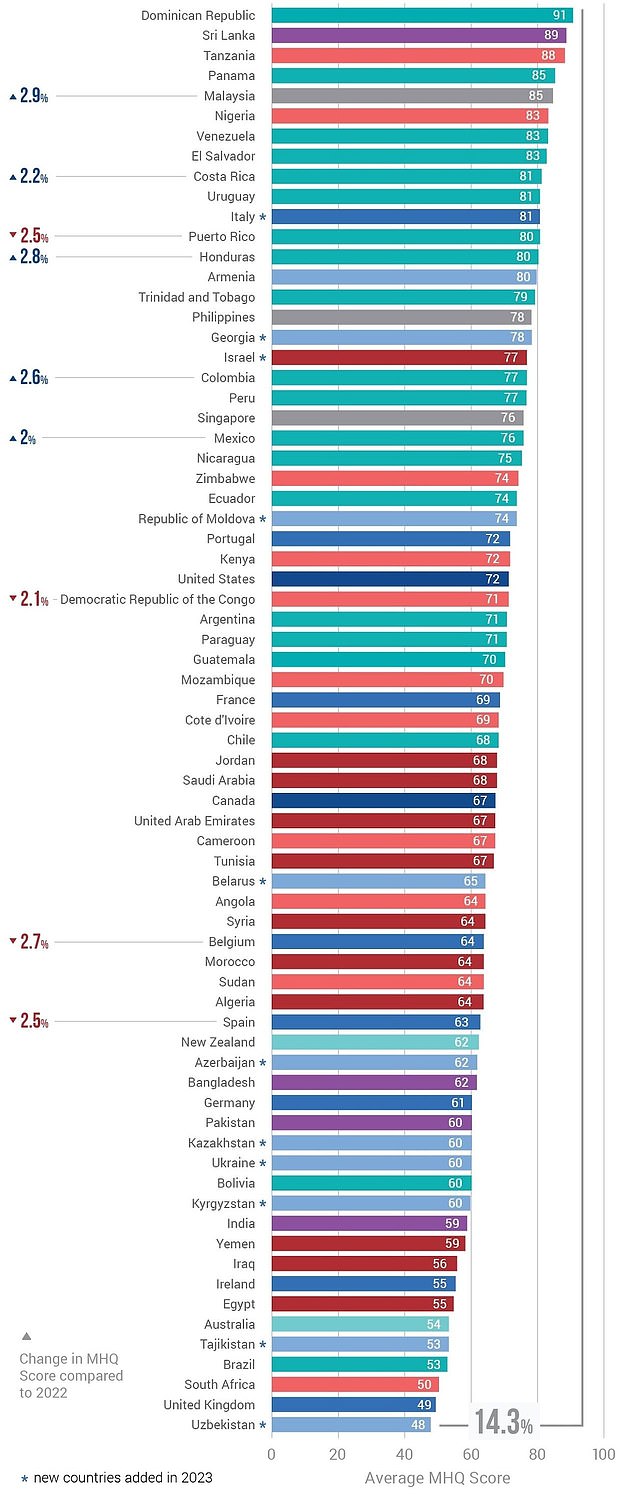

The graph above shows mental well-being across all countries. The numbers on the bars represent the country’s average MHQ score, between zero and 100. The percentage score on the left of the graph represents the change in the MHQ score compared to last year.
This decreased to 61 percent for those who acquired their first smartphone at age 10 and 52 percent for those who acquired their first smartphone at age 15.
Meanwhile, in countries with the highest mental well-being, the average age at which young people first own a smartphone tends to be older (around 14/15 in Latin America and 16 in sub-Saharan Africa), while it is more low in Australia, Canada, New Zealand, the United Kingdom and the United States (11 years).
Another key finding is the impact of processed foods. The researchers found that more frequent consumption of ultra-processed foods led to substantially poorer mental well-being across all ages, with a broad impact on depression symptoms and emotional and cognitive control.
For example, they found that more than half of those who consume ultra-processed foods daily are distressed or struggle with their mental well-being, compared to just 18 percent of those who rarely or never consume ultra-processed foods, an increase of almost three times.
As in the smartphone era, less developed countries tend to have lower consumption of ultra-processed foods, while 60 to 70 percent of food consumption in countries like the US and the UK They are ultra-processed.
A third factor is the decline in family relationships.
The researchers found that 10 percent of 18- to 24-year-olds did not get along with any of their family members and preferred not to see them, compared with just three percent of the older generation.
At the same time, the risk of suffering from mental health problems in adulthood is four times lower if you have close family relationships.
Again, it was the wealthiest countries, such as the United States and the United Kingdom, that reported the least closeness with many adult family members (23 percent) and the least stable and loving children’s homes (39 percent).

